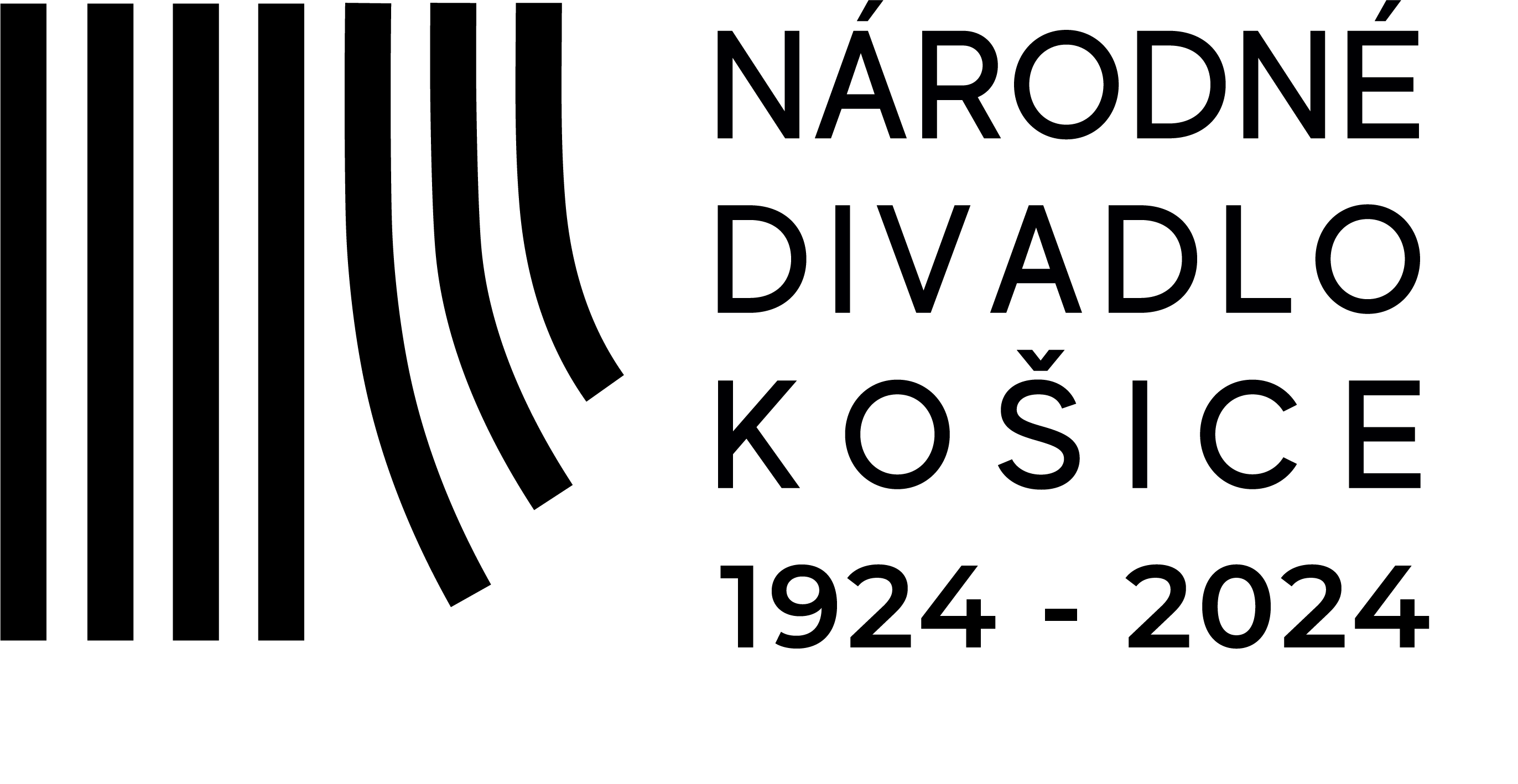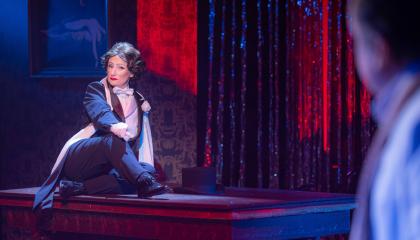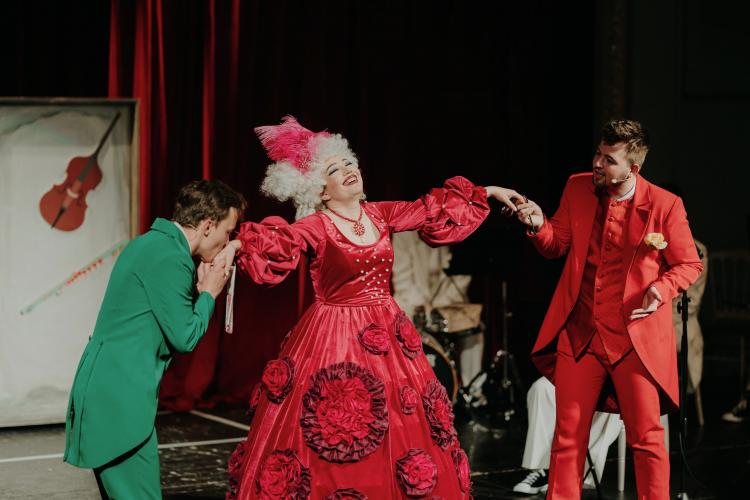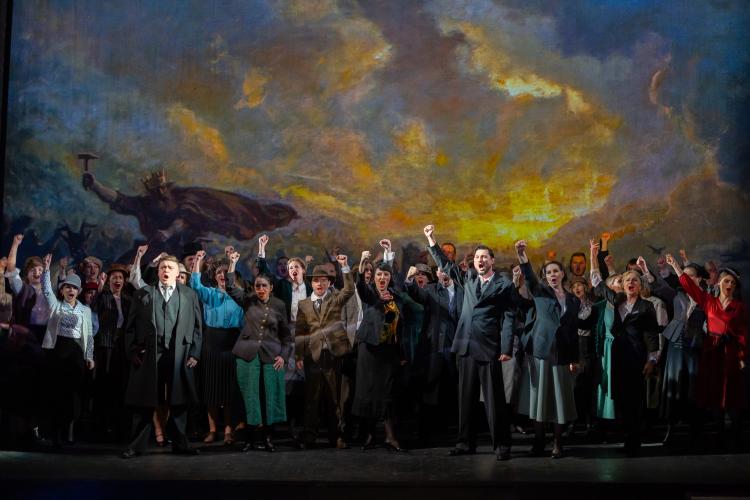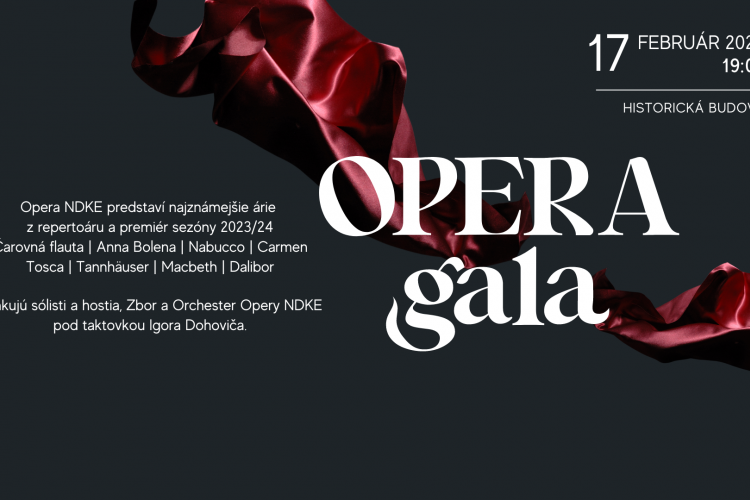Richard Wagner: TANNHÄUSER
A Romantic Opera
After nearly 65 years, the romantic opera by Richard Wagner is returning to the stage of the NDKE Opera, whose full title is "Tannhäuser and the Minnesängers' Contest at Wartburg". Wagner composed this opera during his Dresden period, where he worked as a conductor, and it premiered in 1845. He was inspired by the folk ballad of Tannhäuser, the mythical Venusberg, and the goddess Venus, who sometimes appeared as Frau Holda in medieval legend, a Nordic goddess of the underworld Hel.
The opera features historical figures such as Saint Elizabeth of Hungary, Hermann I of Thuringia, minnesänger Tannhäuser, and German medieval poets Wolfram von Eschenbach and Walther von der Vogelweide. The character of Saint Elizabeth is particularly associated with Slovakia, as some sources suggest she was born in Bratislava, where she spent the first four years of her life, and in Košice, the largest cathedral in Slovakia is dedicated to her, St. Elizabeth's Cathedral. Richard Wagner intertwined these legends and historical figures with the legend of the singing competition at Wartburg Castle (known as the Sängerkrieg in German, meaning the War of the Singers), but historical accuracy was not his primary concern. The theme of his opera revolves around the conflict between sensual and spiritual love, represented on one side by Venus and on the other by Elizabeth, as well as the ambivalence of the modern individual torn between contradictions and unable to make a choice.
"Tannhäuser" is the only opera by Richard Wagner that exists in multiple versions (Dresden, Paris, Vienna). He was preoccupied with it throughout his life and was never entirely satisfied with its form (on the eve of his death in Venice, he said, "I still owe the world Tannhäuser"). Our production will be a "Mischfassung" – a mixed version from several, where the large ballet music of the bacchanalia will dominate at the beginning. The theme will be the "Wagnerian cult" after the composer's death, as well as the life and fate of his only son, Siegfried, who was himself a composer, conductor, director, and intendant of the Bayreuth Festival.
| Libretto: | Richard Wagner |
| Music preparation: | Peter Valentovič |
| Directed by: | Ondrej Šoth |
| Conception and dramaturgy: | Stanislav Trnovský |
| Directing cooperation: | Roland Khern Tóth, Stanislav Trnovský |
| Dramaturgy cooperation: | Roland H. Dippel |
| Stage design: | Juraj Fábry |
| Costumes: | Simona Vachálková |
| Choreography: | Ondrej Šoth |
| Light design: | Ondrej Šoth |
| Conductor: | Peter Valentovič |
| Preparation of soloists and language tutor: | Jan Novobilský |
| Choirnaster: | Peter Valentovič |
| Assistant choirmaster: | Iryna Demyanyshyna |
| Assistant director: | Tomáš Hodermarský |
| Assistant choreographer: | Šimon Stariňák |
| Concertmaster: | Peter Michalík |
| Acompanists: | Júlia Grejtáková |
| Stage managers: | Viera Hronská, Magdaléna Kovalčíková |
| Whisperers: | Magdaléna Kovalčíková, Klaudia Kovalčíková |
| Hermann: | Michal Onufer - Jozef Benci |
| Tannhäuser: | Zurab Zurabishvili - Titusz Tóbisz |
| Wolfram von Eschenbach: | Marián Lukáč - Pavol Kubáň |
| Walther von der Vogelweide: | Maksym Kutsenko |
| Biterolf: | Marek Gurbaľ |
| Heinrich der Schreiber: | Anton Baculík |
| Reinmar von Zweter: | Mihály Podkopájev |
| Elisabeth: | Utarid Mirzamova - Linda Ballová |
| Venus: | Myroslava Havryliuk - Eliška Weissová |
| Young shepherd: | Jana Hrubovčáková |
| Cosima Wagner: | Beáta Drotárová |
| Venus - dancer: | Peter Rolik |
| Clement Harris: | Juraj Jurko |
Press news
- 27. novembra 2023 - Po šesťdesiatich piatich rokoch opäť v Národnom divadle Košice TANNHÄUSER A ZÁPAS SPEVÁKOV NA WARTBURGU
- 15. novembra 2023 - Návrat Wagnerovho majestátu: Národné divadlo v Košiciach ponúkne operu Tannhäuser a jej nadčasový súboj vášní
NAPÍSALI O PREDSTAVENÍ
- 13.2.2024 - hudobnyzivot.sk - Siegried Tannhäuser (recenzia)
- 7.12.2023 - papageno.hu - Cracking the Tannhäuser code (recenzia) - Rozlúštenie Tannhäuserovského kódu (slovenský preklad).
- 3.12.2023 - operaslovakia.sk - Košický Tannhäuser očami Wagnerovho syna Siegfrieda s kontextom na dobové presahy (recenzia)
- 2.12.2023 - rtvs.sk (Správy RTVS) - V Košiciach uviedli Wagnerovho Tannhäusera
- 30.11.2023 - artandhistorymagazine.sk - NDKE uvádza 1. a 3. decembra v premiére operu R. Wagnera Tannhäuser aj s najlepším zborom Európy
- 30.11.2023 - operaslovakia.sk - Outsiderstvo Tannhäusera ako príbeh Siegfrieda Wagnera
- 30.11.2023 - klasikaplus.cz - Premiéra Tannhäusera v Národním divadle Košice
- 29.11.2023 - teraz.sk - Národné divadlo Košice uvedie premiéru opery Tannhäuser
- 28.11.2023 - standard.sk - Národné divadlo uvedie prvú opernú premiéru aktuálnej sezóny Tannhäuser
- 28.11.2023 - kosice.zoznam.sk - Národné divadlo Košice uvedie premiéru opery Tannhäuser
- 28.11.2023 - tv.zoznam.sk - Národné divadlo Košice uvedie premiéru opery Tannhäuser
- 28.11.2023 - filharmonia.sk - Premiéra Wagnerovho Tannhäusera v Národnom divadle Košice so Slovenským filharmonickým zborom
- 27.11.2023 - ssn.sk - Po šesťdesiatich piatich rokoch opäť v Národnom divadle Košice TANNHÄUSER A ZÁPAS SPEVÁKOV NA WARTBURGU
- 27.11.2023 - mojakultura.sk - Tannhäuser je v spoločnosti outsiderom, snaží sa objaviť skutočnú lásku
- 15.11.2023 - mojakultura.sk - Nadčasový súboj vášní: Národné divadlo v Košiciach uvedie operu Tannhäuser
- 10.11.2023 - mojakultura.sk - Wagnerov Tannhäuser opäť v Košiciach po takmer 65 rokoch
